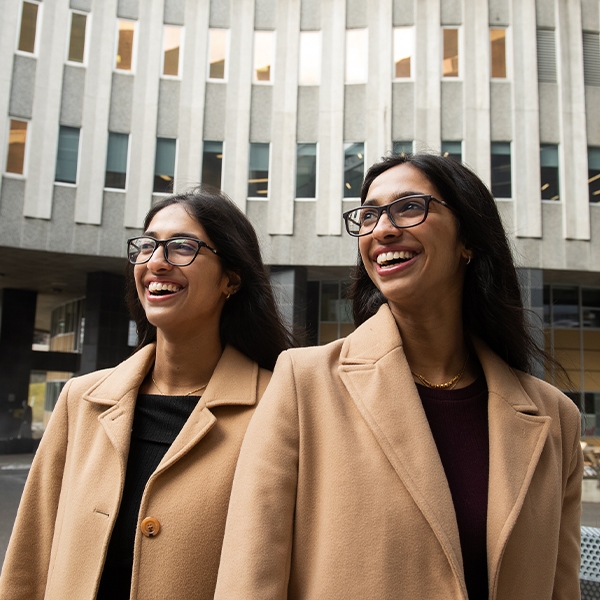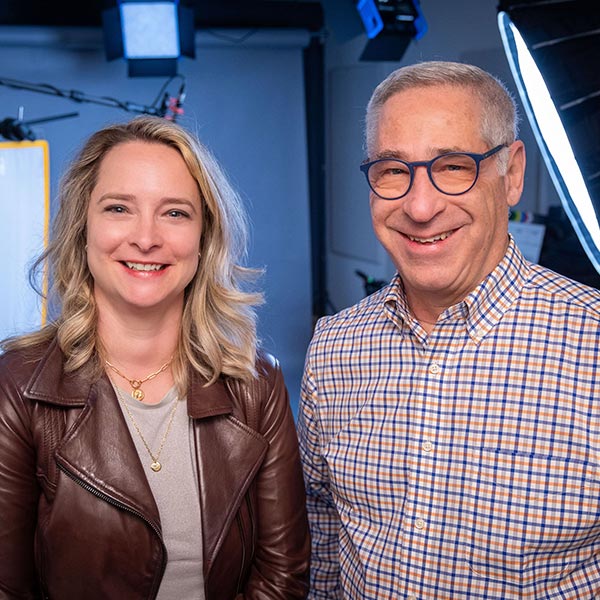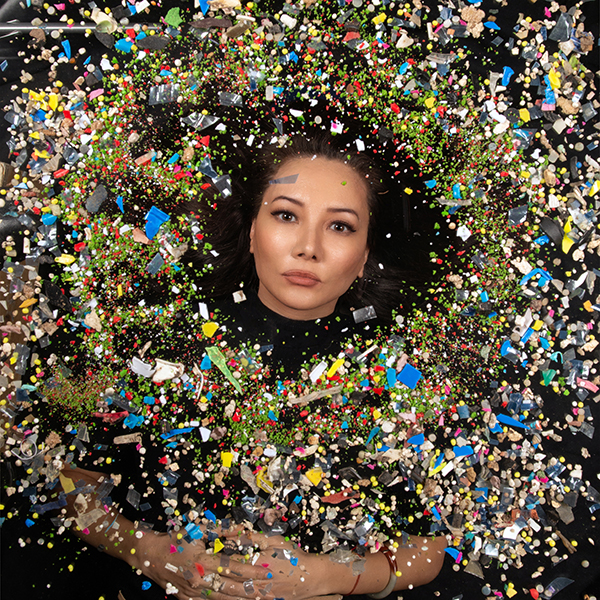“The timing for this is just right,” says Montreal Neurological Institute director Guy Rouleau. He is talking about The Neuro’s new Azrieli Centre for Autism Research (ACAR).
“Ten years ago, autism was much more mysterious. We’ve made a lot of inroads at this point. We’ve identified some of the genetic causes for autism” – [Rouleau himself has played an important role on that front] – “and that opens doors. We think we’re at a point where there are going to be some important advances made and we think [ACAR] puts us in a good position to make our own contributions to those advances.”
ACAR was officially announced at a press conference on October 23. The Azrieli Foundation is supporting the new centre with $16 million in funding.
Principal Suzanne Fortier, BSc’72, PhD’76, speaking at the announcement, thanked the Azrieli family and the Azrieli Foundation “for this visionary and generous support. This investment will make it possible for our McGill scientists to advance knowledge and make the breakthrough discoveries that are needed to understand autism and eventually provide hope for the many families in Quebec, in Canada and around the world who are living with this disorder.”
Quebec minister of health and social services Gaétan Barrette was also present at the announcement and congratulated the Azrieli Foundation for the role it played in ACAR’s creation. “This exceptional donation will have enormous benefits for people on the autism spectrum and their families.”
The Neuro has long been known for nurturing tight links between the research that goes on its labs and the clinical care it offers to its patients. “It is our model,” says Rouleau. The new centre will adopt that approach as well.
“It is relatively well-known in the scientific literature that it takes about 25 years for discovered innovations to make it into applications,” says Mayada Elsabbagh, BSc’98, an assistant professor of psychiatry and one of the McGill researchers affiliated with ACAR. “And yet, this is fundamentally a process that we can accelerate when there are the right conditions.”
She says that research into autism “is already leading to changes in how care is being delivered, whether through diagnostics using genetic testing, or new intervention approaches that we’re able to directly test in clinical trials. These are just a couple of examples of things that are happening right now.”
She believes the new centre will work hard to “remove the traditional boundaries between discovery and translation.” Early interventions can have a profound impact on the lives of individuals with autism and their families, says Elsabbagh, so it’s vital to make quick use of important new findings.
ACAR will use a range of approaches, including genetic research and brain imaging, to identify the genes and other risk factors that are associated with the disorder. It will forge closer links with patients and their families to provide swifter access to new treatments and programs. It will train new generations of autism specialists.
Naomi Azrieli, the chair and CEO of the Azrieli Foundation, characterizes the foundation’s $16 million gift “as something that didn’t come out of the blue. This is the culmination of some long term thinking that we’ve been doing about how we could invest in this frontier of discovery.” One of the focal points for the foundation is its support for neurodevelopmental research, particularly in the area of autism spectrum disorders.
“We are really interested in a comprehensive approach,” says Azrieli, “supporting the very early stages of research, finding ways to integrate that research into treatments and better outcomes, training new specialists, providing support for patients and their families. The Neuro is uniquely positioned to bring all of these elements together. We see this as the perfect fit.”
Elsabbagh says that ACAR’s focus on training will be critical.
“One of the major challenges is that a lot of the existing research and knowledge [around autism] has not been translated yet into practice [because] we lack training programs for highly qualified professionals. We still see [instances of] the old ways of thinking about interventions that are one-size-fits-all.”
Autism manifests itself in different individuals in very different ways, she says. “Our vision for the future is that services and interventions are directly tailored and personalized to the needs of individual children and families, considering their context.”
“Given the increasing numbers of people with autism that we’re seeing [some estimates indicate that as many as one child in 68 in Canada is diagnosed with autism spectrum disorder], there’s a serious shortage of health care professionals, support workers and teachers who have appropriate training,” says Azrieli. “I’m hoping that we’ll move the needle in that way.”
Recent research by scientists at the Neuro and the Ludmer Centre for Bioinformatics and Mental Health discovered that some of the abnormalities in the brain that are associated with autism can be seen in children as young as six to 12 months of age. Elsabbagh, whose own research examines the root causes of autism, says such research is essential.
“Studying brain development early on, before it gets complicated by interactions, [presents] the best opportunity to understand the underlying causes [for autism]. That period of time where the brain is still in its early stages of development is key.”
“Autism is complex,” says Rouleau. “It is caused by many, many different genes that are all involved in the functioning of the brain.” In his view, as we gain a better understanding of the biological factors that affect autism, we also gain a better understanding of the brain as a whole. Rouleau suspects that “a significant fraction of the genes that build the brain and make the brain work” could be connected to autism in some fashion if they are “mutated or abnormal.”
Rouleau, who will serve as ACAR’s first director, says that while the new centre will be housed at The Neuro, autism researchers and programs throughout the city can expect to benefit from ACAR’s existence.
“In fact, it will involve all of Montreal. There are certain components of this donation that are for training purposes and that is going to be open to everybody. We will fund some work done outside of McGill. Most of the money will be spent at McGill – mostly at The Neuro, but also at the [McGill University Health Centre] and also at the [Douglas Mental Health University Institute]. But there are other sites in Montreal that are involved in this.”
A new provincial network of autism researchers is also being established this week by the Fonds de Recherche du Québec and Rouleau foresees partnerships on that front as well. “All these things will be intertwined.” “This is a tremendous opportunity to work together as a community,” adds Elsabbagh.
“I see this centre as a place where autism meets neuroscience at its best,” says Elsabbagh. “There is a remarkable amount of expertise here in very different disciplines – including experts who haven’t traditionally been engaged in autism, but who are focused on extremely relevant areas in the neurosciences. This is exactly what gives me a lot of hope that we can make major breakthroughs, because we’re basically putting some of the best minds in the world onto the task of autism.”


